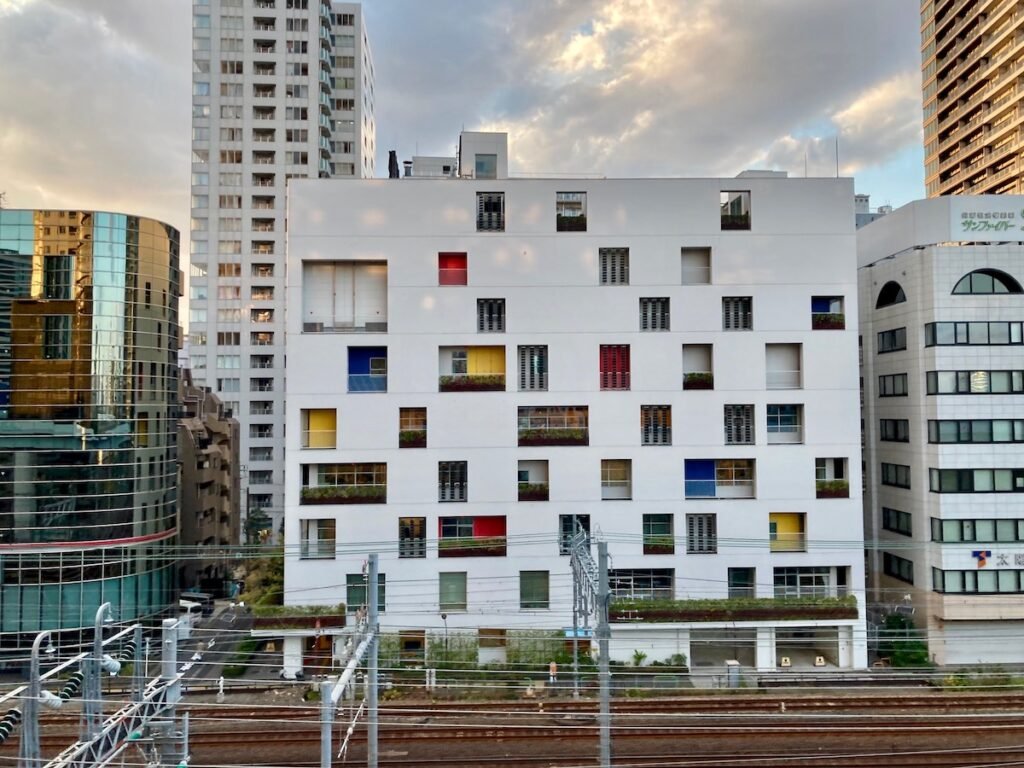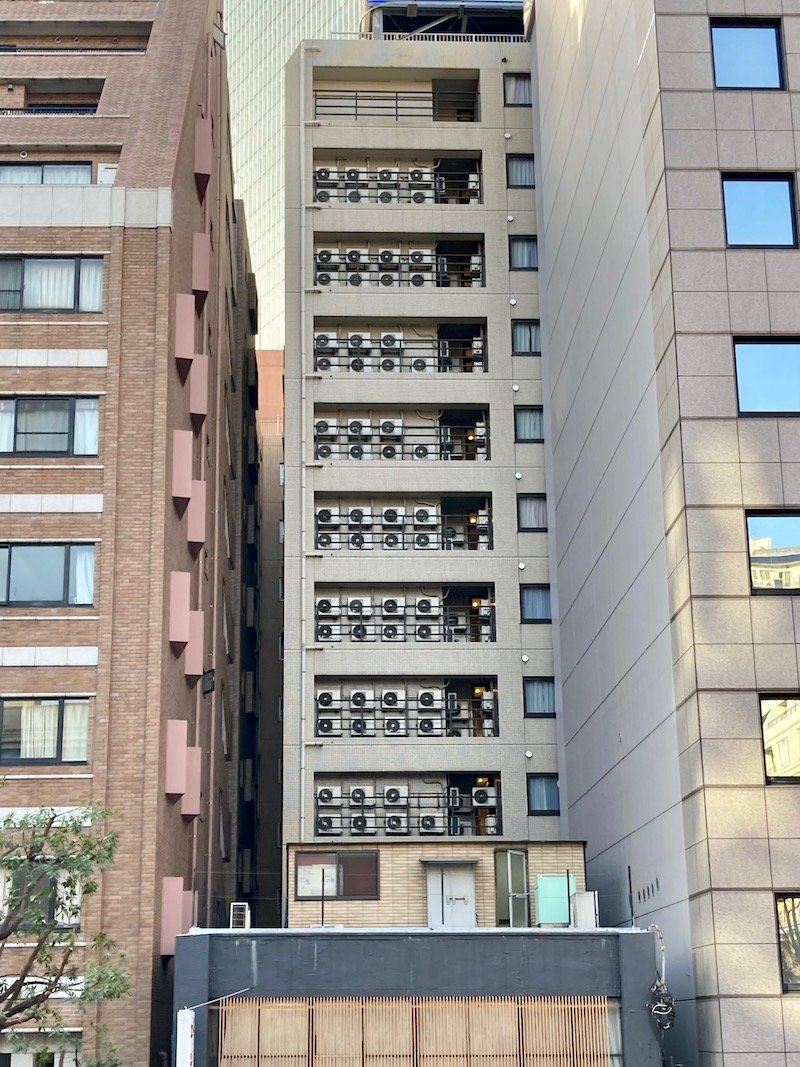2023 | 5 min read
The inside of a Tokyo Metro train has seven facing seats, usually occupied, thus it’s possible to form any theory of the city expressible as a fraction of seven. One theory that often turns out to be correct is that five-sevenths of the city is completely glued to its phone. Of the two non-phone-holders, the face of at least one will show permanent signs of the habit: a knitted brow and eyes converging at arm’s length. Anyone whose eyes wander freely is probably a lunatic. You should avoid this last person at all costs unless it’s actually just your reflection in the glass.
In a Shinjuku underpass, a lone police officer supervises a crime scene: an old bicycle is suspected of being abandoned. The policeman uses a two-way radio to request information on the whereabouts of the bicycle’s owner. Later, I return and the bicycle is still there, the policeman is still there, the radio is still crackling away. I check my watch. One hour has passed: the typical length of a TV police drama.
In the Miel Cafe in Kudanshita, surrounded by rocking horses, she tells me that people are weird, that they act all friendly then she never hears from them again. It’s Tokyo, I tell her, they’ll be thinking: “She was a really nice person and I can’t wait to see her again next year.”

The OK Store supermarket in Yoga has an artist in residence. He does incredible things with vegetables and sometimes works with fruit. He stacks Chinese cabbages in a mysterious oriental ziggurat. He sculpts with shimeji mushrooms, turning lumpy polyethylene packs into smooth-sided pyramids of fungi. He brings rhythm to celery and order to pineapples, two things previously considered impossible. He’s an artist, but he prefers to be called a shelf-stacker and receive a basic hourly wage.
In an art gallery at the top of the Mitsukoshi department store, a woman asks if I’d like to see the other room. She unlocks a door, ushers me through it, then disappears. I find myself alone in a small anteroom, most of which is given over to a huge boardroom table. On the walls are some small artworks, none of them very interesting. I wonder if I’m supposed to sit down and wait for someone to arrive. Are we about to conclude a sale? I knew I shouldn’t have worn my best shoes.
On the down-escalator at Parco Kichijoji, a young man in sunglasses is reading a book. I fail several times on the switchbacks to catch the title. For the sake of the story, let’s say it was a book of beat poetry. Reading a book on an escalator might seem unusual, but in a city like Tokyo it’s conceivable that a journey by escalator might take longer than one by train.

At the Ebisu Food Hall, a young salesman takes a seat at the next table. He wears his navy blue suit a little too tightly and dabs his glistening forehead with a Ralph Lauren handkerchief. He is still fresh-faced and knows only one trick: listen thoughtfully and respond as though the other person has said something completely true and profoundly interesting. Today though, he’s meeting a friend from university, who seems surprised by this new human being across the table.
At Cafe Casa historical pancake cafe in Aoyama, the American proprietor aims a nervous glance at his two new customers. One looks Japanese, the other is clearly western. Both customers say hello in English, but the American replies in Japanese. Maybe he didn’t want to change brains, I think.
Setagaya Ward Office, bureaucratic command post for almost one million Tokyo residents, is a working museum of handmade signs, folding metal chairs, worn carpet tiles, sanitised ballpoint pens, forgotten mascots, middle-aged men in armbands, and recent graduates to the civil service trying not to cry at the sheer primitive mess of it all. After battling through several forms, we leave with what we came for: our personal number cards, passport to a new era of digital government in Japan.

At the Japan Foundation Library in Yotsuya, an excitable one-sided conversation. A man has arrived in Japan to do his PhD at Sophia University. He’s explaining his academic background to the librarians in a mix of German-accented English and broken Japanese. His work is urgent and it cannot proceed without books. Do they have them here? Yes, good. He will return with a full list, but for now he must get back to his research. There is no time to lose! When he leaves, the Japanese women exhale softly. They say nothing among themselves.
At the Tamagawadai polling station, I feel self-conscious waiting inside. Japanese citizens avert their eyes and hurry past. “Do you have the right to vote?” asks a kind volunteer in perfect English. “Sorry, I’ve come to ze wrong place,” I tell her, speaking inexplicably in a slight French accent.
Trouble Peach in Shimokitazawa is one of those tiny bars filled with midnight people in search of community or an escape from polite society. One regular looks us up and down, decides he has seen enough, and extends an invitation to join his band. What’s the name of the band, we ask, just making conversation. He thinks about this for a few seconds before his eyes light up. The Fucking Band, he says.

Odaiba’s Telecom Center is one of Tokyo’s more unusual date spots. The observatory on the 21st floor overlooks the massive World Cargo Distribution Center, part of the Aomi Container Terminal. The best time to visit is said to be in early November, when generic rust-brown shipping containers commingle with those of the Evergreen company in a stunning display of autumn foliage.
Backstage at the Park Hyatt Tokyo is a dismal scene of fluorescent lights, low ceilings, narrow desks, metal filing cabinets and other generic office furniture. Despite its glitzy reputation, the hotel is owned and managed by Tokyo Gas, which considers it wise to remind its luxury hotel managers that they work for a utility company.
At Odaiba’s Miraikan, or Future Museum, you can have a conversation with an Intelligent Adult Droid. She seems nice enough. A little aloof for my tastes. Otherwise, all of the exhibits and displays are designed with children in mind. The future is theirs to create, after all. That’s when I experience a life-changing revelation about the future: I’m not invited.
Next: Hidden Olympics
